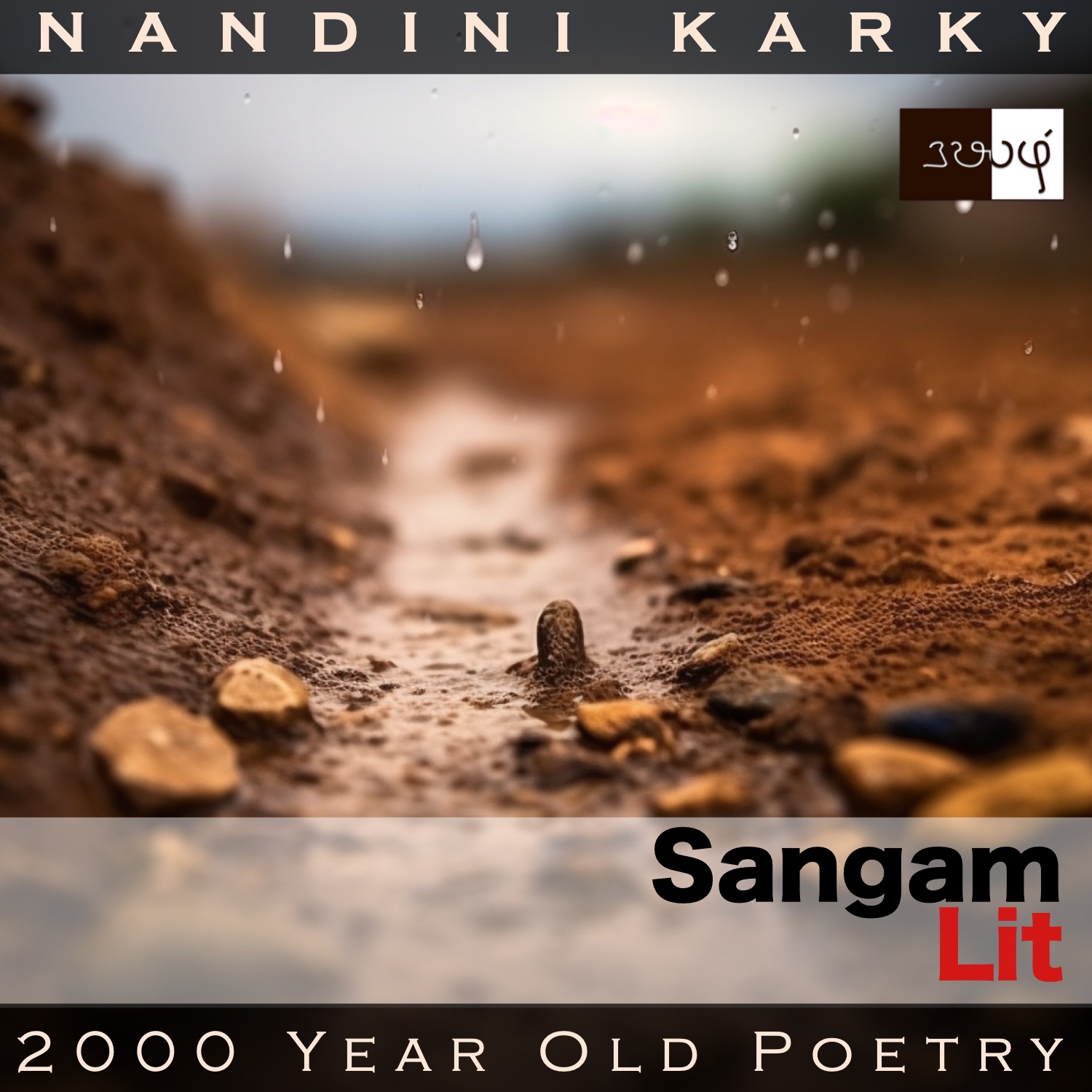Podcast: Play in new window | Download
Subscribe: Apple Podcasts | Spotify | Amazon Music | Android | iHeartRadio | Email | TuneIn | RSS | More
In this episode, the greatness of a king’s ancestor is illustrated, as depicted in Sangam Literary work, Puranaanooru 174, penned about the Velir King Malaiyamaan Chozhiya Venaathi Thirukkannan by the female poet Maarokaththu Nappasalaiyaar. The verse is situated in the category of ‘Vaagai Thinai’ or ‘Victory’ and portrays the timely presence of this king in the life of his subjects.

அணங்குடை அவுணர் கணம் கொண்டு ஒளித்தென,
சேண் விளங்கு சிறப்பின் ஞாயிறு காணாது,
இருள் கண் கெடுத்த பருதி ஞாலத்து
இடும்பை கொள் பருவரல் தீர, கடுந் திறல்
அஞ்சன உருவன் தந்து நிறுத்தாங்கு,
அரசு இழந்திருந்த அல்லல் காலை,
முரசு எழுந்து இரங்கும் முற்றமொடு, கரை பொருது
இரங்கு புனல் நெரிதரு மிகு பெருங் காவிரி
மல்லல் நல் நாட்டு அல்லல் தீர,
பொய்யா நாவின் கபிலன் பாடிய,
மை அணி நெடு வரை ஆங்கண், ஒய்யெனச்
செருப் புகல் மறவர் செல்புறம் கண்ட
எள் அறு சிறப்பின் முள்ளூர் மீமிசை,
அரு வழி இருந்த பெரு விறல் வளவன்
மதி மருள் வெண்குடை காட்டி, அக் குடை
புதுமையின் நிறுத்த புகழ் மேம்படுந!
விடர்ப் புலி பொறித்த கோட்டை, சுடர்ப் பூண்,
சுரும்பு ஆர் கண்ணி, பெரும் பெயர் நும் முன்
ஈண்டுச் செய் நல் வினை ஆண்டுச் சென்று உணீஇயர்,
உயர்ந்தோர் உலகத்துப் பெயர்ந்தனன் ஆகலின்,
ஆறு கொல் மருங்கின் மாதிரம் துழவும்
கவலை நெஞ்சத்து அவலம் தீர,
நீ தோன்றினையே நிரைத் தார் அண்ணல்!
கல் கண் பொடிய, கானம் வெம்ப,
மல்கு நீர் வரைப்பின் கயம் பல உணங்க,
கோடை நீடிய பைது அறு காலை,
இரு நிலம் நெளிய ஈண்டி,
உரும் உரறு கருவிய மழை பொழிந்தாங்கே.
A long song with some fantastical elements to etch the glory of this Velir King, who is said to have come in the line of Malaiyamaan Thirumudi Kaari. The poet’s words can be translated as follows:
“As the fearsome demons joined together and hid it, not seeing the sun that shines from afar, those on this round earth lost their sight owing to darkness. To end their sorrow-filled suffering, the strong one in the hue of kohl brought it back and made it shine. Akin to that, in the worry-filled time when they had lost the rule, to end the suffering of the fine and fertile country, where the flood of the copious Kaveri breaks its banks, the one who Kabilan of the truthful tongue sang about, there in the mountains clothed by dark clouds, the one who saw the hasty retreat of famous soldiers, with impeccable fame, atop Mullur mountain, found in the difficult path, the one with great strength handed them, with drums roaring in the front, the moon-like royal umbrella, and once again established the rulers and made their fame soar!
With a fort inscribed with the symbol of a cave-dwelling tiger, shining ornaments, garlands swarming with bees, was your ancestor with a renowned name. Owing to the good deeds done here, he has gone to a higher world. Owing to that loss, the hearts of the people attacked in all directions was filled with sorrow. And you came to allay that, O esteemed leader wearing garlands many! Grinding away rocks to pebbles, drying up forests, and emptying ponds once filled with overflowing waters, the summer had extended for long. In that angst-filled time, akin to how the roaring rains pour down and fill vast lands, you appeared!”
Time to take a closer look at the details herein. The poet starts by telling the story of how the sun was hid by the demons. As can be expected, the people in the world soaked in darkness could not see. At this time, a dark-skinned seems to have found this sun and put it back, as if he was hanging back a painting that had fallen down! Anyway, this mythical story of gods and demons and the sun being stolen and found seems so out of character for Sangam Literature with its sensible theories about the world. Perhaps these were the influences of other religions and cultures that was spreading in the land then. Returning, we understand that this story of putting back the sun is a parallel of how a great king who ruled from Mullur, reinstated the Chozhas, who had once lost their power, and made them rise tall in this world! That person was none other than the ancestor of this king being sung about, the one who had the great fame of being praised by the poet Kabilar. They are referring to Thirumudi Kaari, say scholars.
After this great ruler, the one who restored the glory of Chozhas, passed away and reached a higher world, thanks to his good deeds on earth, there was huge void in the lives of his subjects. Consider that time when even rocks of mountains seemed to be ground into dust, when overflowing ponds dry up and when forests wither away – a harsh summer. To end that, if rains pour down and break the land into puddles, imagine how the world would smile. That’s how this king appeared to take the place of his great ancestor, concludes this poet. The core emotion highlighted in this verse is the joy experienced when the right replacement is found to fill the shoes of a great person, so as to continue that walk of strength in the impressive footprints of that predecessor – Something we can relate to, in every sphere of life, even today!




Share your thoughts...